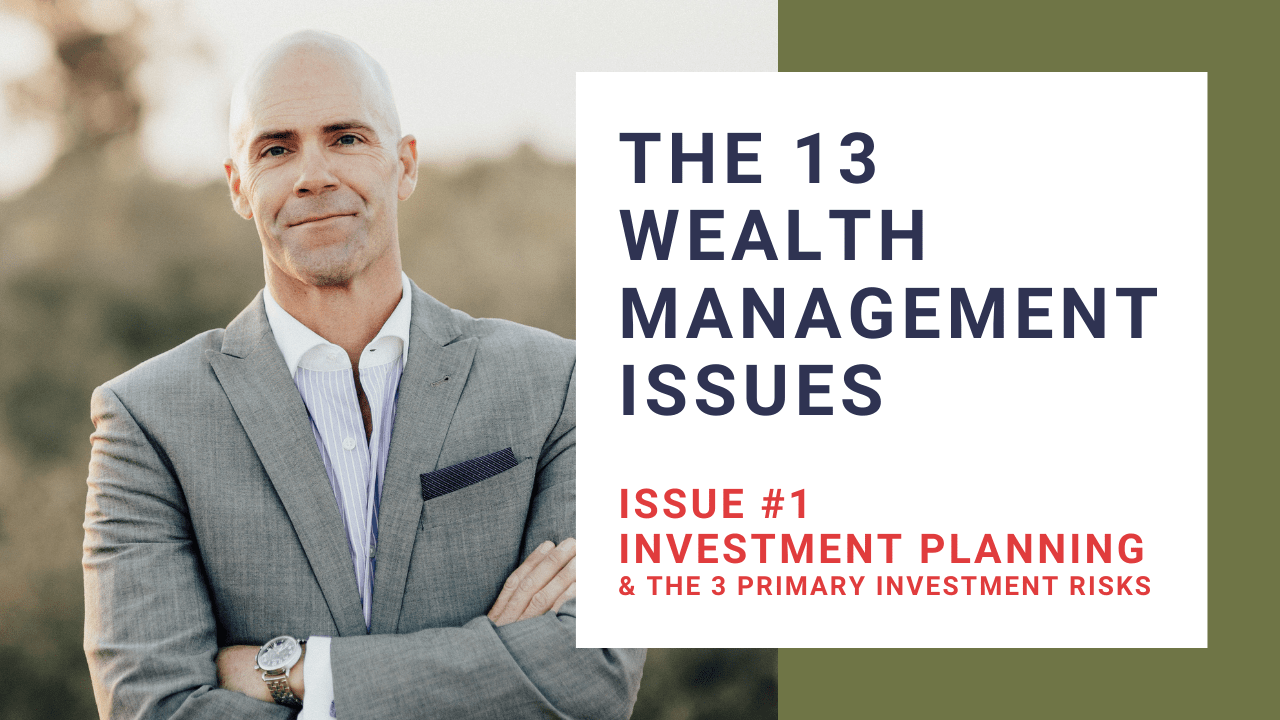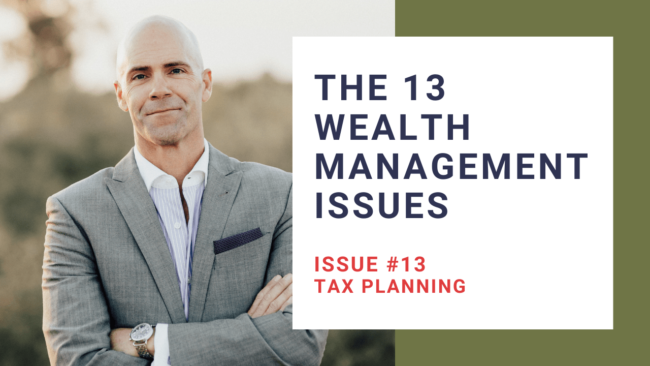
13 Wealth Management Issue #1: Investment Planning & Risks
The previous installment provided a brief introduction to not only what it means to be a holistic wealth advisor, but also the 13 Wealth Management Issues most consistently impacting our clients and their families. In this and upcoming posts, the focus will be each of the respective issues in order, starting with Investment Planning & the Three Primary Investment Risks.
Investment Planning & the Three Primary Investment Risks
Number 1 out of 13 in our Wealth Management Issues Series
At first glance, the phrase, ‘Investment Planning’ likely seems fairly straightforward. We have money. We invest. We hope for positive outcomes. Although a typically held view of investment planning, our position is this subject has much greater depth; particularly a number of common risks to which investors expose themselves unnecessarily. A comprehensive view of Investment Planning begins with gathering a full inventory of ALL assets. Too often, clients and advisors alike, take a segmented approach. Let’s review the 401k. Let’s review the IRA. Let’s review the 529. Let’s review the brokerage account. Etc. Etc. Etc. Holistic Wealth Planning evaluates all assets comprehensively in an effort to make sure certain risks aren’t being taken on. Really, this approach is a philosophic approach. Our investment philosophy is rooted in the feelings our clients have with respect to risk. After conducting a disciplined discovery process and an individualized risk profile questionnaire to determine what type of investments are appropriate, we utilize a three-tiered approach whereby various investment strategies are aligned with clients’ goals. We will provide more information on the three-tiered approach, shortly.
Often, AFTER gathering a client’s full inventory of investments and having an in-depth conversation about their goals/expectations and risk profile-and PRIOR to discussing actual strategy–our process includes reviewing three primary investment risks:
- Inappropriate Asset Allocation
- Failure to Monitor and Maintain Asset Allocation
- Inappropriate Asset Correlation
Inappropriate Asset Allocation
A thorough review of a client’s situation, future, feelings, family dynamics, complexity, goals, risk tolerance, and time horizon is critical to avoid common investment risks. The benefit of an advisor is objectivity…being detached emotionally. Often, we review portfolios with significant overlap in asset allocation due to a segmented approach to individual accounts rather than a comprehensive view. Note: having multiple advisors virtually ensures your asset allocation will be inappropriate.
Failure to Monitor and Maintain Asset Allocation
Your portfolio is not static. Market forces are often like Mother Nature. All over the place! This being the case, it’s critical to have a disciplined and systematic process for review and rebalancing. Additionally, your life, which isn’t static either, may dictate changes to your portfolio and risk. Note: having multiple advisors significantly increases this risk. Regularly monitoring your portfolio and your feelings about risk on a regular basis are strongly advised.
Inappropriate Asset Correlation
Each investment must interrelate appropriately without overlaps or gaps to ensure success. Lack of correlation leads to overlap which simply means your portfolio is not balanced appropriately and is a HUGE investment risk. Concentration Risk is when a client has too much exposure to one stock or one sector. Additionally, this risk often leads to the risk of missed opportunities when other sectors do well.
To offset this final risk, our approach is to take a three-tiered approach utilizing Traditionally Asset Allocated Investments, Opportunistic Investments, and Guarded Investments. Traditional investments include equities, fixed income, and cash. Stocks. Bonds. Exchange-traded funds. The strategies you google. Where we differentiate and where we assess appropriate asset correlation is via Opportunistic Investments. These strategies include asset classes which do NOT correlate with the market. In some respects, these options provide a hedge against traditional market risk. Utilizing publicly non-traded real estate investment trusts, oil/gas, 1031 exchange, Business Development Companies, leasing programs, etc. for a portion of a portfolio may enhance diversification. Finally, Guarded Investments. Certain types of investments protect you against market decreases, i.e., no risk of market loss, grow and distribute tax-free, while also providing layers of asset protection against lawsuits & creditors. Implementing our three-tiered approach goes beyond the traditional modality of asset allocation providing clients with a unique platform to pursue their goals & objectives.
Consider this medically based example: If you need to have your knee reconstructed, would you have a different Orthopaedist work on your MCL, another work on your PCL, and yet another on your ACL? Of course not. What risks would that pose to the patient? What would happen if there was zero coordination amongst those surgeons? Moreover – could you ever trust any of those surgeons again for exposing you to those risks without properly explaining them to you so you could make a different decision? Would you let them operate independently? You’d probably say, “I’d never do that in 100 years!” But if you did, what would you have to do to make sure the procedure had a favorable outcome? You’d probably have to have a meeting with all three Orthopaedists to discuss specifically what each of them would be doing, while also making sure their respective teams are working collaboratively. Now…consider your current investment and retirement goals. If you have assets with more than one advisory firm, who is responsible for coordinating the ‘operation’ among your investment advisors/Orthopaedic surgeons? Who is responsible on your team today for creating that alignment? In the investment world, we call those choices asset allocation. Asset allocation is the choices and strategies that your advisors put together to help you pursue your goals while mitigating as much risk as possible. In the same way you should trust your surgeon to explain all possible risks to which you are exposed, you should expect this from your advisor or wealth strategy team. If you have money currently invested with 2-4 advisory firms, who is on point to coordinate between them and mitigate those risks?
If it’s your responsibility to be coordinating your team, you might need some help with that coordination. But there are other risks. In addition to managing that risk of lack of coordination of asset allocation, there is the alignment within each of those portfolios. Then there is the ongoing assessment to make sure the portfolios are working together as market conditions change or more likely, your life goals and circumstances change. The surgical analogy only works so far because that’s a single event; not a lifetime of saving for your retirement.
In summary, our disciplined process provides insights into your current situation, your future goals, your feelings with respect to the market, a review of risk, and ultimately an analysis of our findings. On an ongoing basis, our wealth management platform, Mosaic Wealth Portal, provides each individual goal the ability to determine if you are on track to meet each objective in real-time. Our continued philosophy of goals-based reporting is never more prevalent and nothing more important to a client having confidence their goals are on track and being pursued effectively.
When considering these issues, it’s important to ask yourself, how do any of these affect you, your family, and your goals? The following installments will cover each of these Wealth Management Issues in greater detail. Our hope is this series of chapters will provide not only an educational forum but also promote thought, leading to action…in a holistic manner, of course. Learn about our other 13 Wealth Management Issues here.
Watch our Whiskey & Wealth Wednesday video of this article:
If you would like to learn more about this subject please contact us and we’ll be happy to help.
Investments in securities do not offer a fix rate of return. Principal, yield and/or share price will fluctuate with changes in market conditions and, when sold or redeemed, you may receive more or less than originally invested. No system or financial planning strategy can guarantee future results. Therefore, no current or prospective client should assume that future performance or any specific investment, investment strategy or product will be profitable.
By Anthony C. Williams, CWS, ChFC, MRFC, CLU | Investment Advisor Representative | President & Founding Partner of Mosaic Financial Associates & Orthopaedist Advisory Group | Securities and advisory services offered through Cetera Advisors LLC, Member FINRA/SIPC, a broker/dealer and a Registered Investment Advisor. Cetera is under separate ownership from any other named entity.







